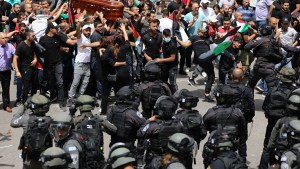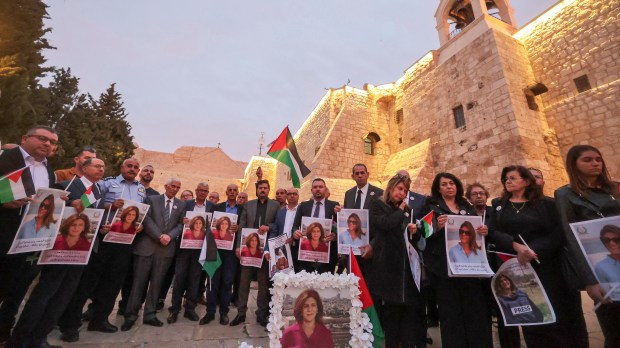The tragic killing of the Palestinian Christian journalist, Shireen Abu Akleh, has revealed the futility of continuing the status quo, and the need for a final peace between Israelis and the Palestinians. Her death has also encouraged more people to stand up against the sectarian divide and the fundamentalist ideas that feed it.
On May 11, Israeli special forces raided the refugee camp located in the Palestinian city of Jenin. According to the Israeli military, soldiers entered the camp to arrest militant members of the Palestinian Islamic Jihad and Hamas supected of recent terrorist attacks in Israel. However, during an armed confrontation between militants and the Israeli Defense Forces, Shireen Abu Akleh was tragically killed.
Immediately after Abu Akleh’s death, the question of who was responsible monopolized conversations on social media. It is an important matter that should be addressed – whoever is responsible for her shooting should be prosecuted. Two weeks since her death, though, it is right to reflect on the broader issues surrounding the killing of Abu Akleh.
First, Abu Akleh’s death has placed the Israeli-Palestinian conflict once again on the global agenda as a conflict that demands a resolution. Second, within Palestinian society, the death of a Palestinian Christian revealed the existence of the sectarian problem between Muslims and Christians.
The world turns its eyes to the Palestinian-Israeli conflict again
For the Israeli army to enter a Palestinian city is not a surprising or a new phenomenon for Palestinians. This has happened repeatedly since 1967, and even following the Oslo agreement signed in 1993, which gave the Palestinian authority governing authority over the major cities of the West Bank and Gaza. Abu Akleh covered these hot points in the Israeli-Palestinian conflict for over two decades; she would be in every major raid, clash, or protest. However, the world seems to have forgotten the reality of life in Palestine.
The current post-Oslo Israeli-Palestinian relationship is not a state of war, nor is it a state of peace. The situation becomes temporarily quieter or more violent depending on different circumstances. A period violence, for example, may erupt after a change in Israeli restrictions at Alharam Alsharif/Temple Mount in Jerusalem, or following a particularly violent protest or government action. Likewise, settlers’ attacks and the lack of serious efforts to make a final peace agreement between the Palestinian Authority and Israel have sparked periods of violence. Palestinian organizations like Hamas and Islamic Jihadi incitements and attacks against Israelis are another critical factor. Since April, more than 19 Israelis have been killed in Palestinian attacks that Hamas and the Palestinian Islamic Jihad endorsed.
Since the failure of negotiations between Israel and the Palestinian Authority, a wave of either pessimism or willingness to ignore the conflict has dominated the global political discourse concerning the Israeli-Palestinian conflict. There is an assumption that the status quo can endure without paying attention to the reality of the life of the people living in the land. Scenes of innocent Israeli civilians being targeted by lone-wolf Palestinians followed a campaign of incitement by Hamas. Furthermore, the footage of the Israeli army raid of Jenin that resulted in the killing of the Abu Akleh brought to the world’s attention what Christians of the Holy Land have known for a long time: there is a need for a political solution based on respect for the interest and dignity of the two people living between the Jordan River and the Mediterranean Sea.
Following Abu Akleh’s death, we were all angry. How could we not be? She was innocent, and her death reminded us of the depth of the pain and the loss of innocent lives this conflict has cost Palestinians. It was not just any journalist that was killed, but Abu Akleh, whose reporting on Palestine is known to every Palestinian if not to every Arab. There are those who react to this tragedy with anger and a desire for revenge, and they risk inflaming the conflict, and risking more loss of life. And there is a second group whose anger and pain have led them to emphasize the importance of peace between the two people. Shireen’s brother Anton represented the second view when, in an interview for the Times of Israel, he said: “Despite how bitter and painful it is for Palestinians and for everyone … I ask the Israeli people to see this as an opportunity for peace. The Palestinian people want peace and aim for peace. This feeling should be shared.”
In mourning the killing of a Christian Palestinian journalist, an innocent life, senselessly lost, we should be angry and demand clear accountability from whoever is involved in this tragedy. However, a Christian response should recognize that more innocent lives will be lost unless the very core of the problem is resolved, which is the conflict. This conflict has to end; peace should be achieved between the two people. This can happen when we recognize that the status quo is not workable. Palestinians need to live in freedom and security, as do Israelis. After the killing of Abu Akleh and the last round of violence, it is easy for us to fall into tribal thinking and the desire for revenge. However, as her brother clearly stated, both sides should come to accept the need for a peaceful political solution between the two people.
Muslim and Christian Palestinians mourning together
The death of Abu Akleh exposed the unworkability of the Israeli-Palestinian conflict. Moreover, it also revealed the danger of contemporary sectarianism threatening both Christian Palestinians and a healthy Palestinian national movement. Since 1997, Abu Akleh reported on Palestinians’ stories within the conflict. She was there for the Second Intifada, four wars in Gaza, and much more. The fact that she has been all over Palestine reporting our stories, even during times of danger, has turned her into a role model for Palestinian women who dreamt of becoming journalists one day. My generation, those of us who grew up during the second Intifada, have heard her gentle yet confident voice as she reported from different locations. She said that she chose to be a journalist to be close to the “human beings,” and her words were genuinely felt by Palestinians.
However, the killing of Abu Akleh has opened an old debate among Muslim Palestinians and the Arab world in general, which is whether it is appropriate for Muslims to pray for Christians who have died. The fact that Abu Akleh was so well-known in the region has made it hard for many Muslims to comply with the idea that one cannot wish for a Christian to rest in peace. While such a thing might be viewed as a matter of merely theological difference, it raises the question of whether Christian Arabs enjoy equal rights with Muslims in the Middle East. This debate has become more relevant given the rise of an Islamist political movement that has always been vague in its view of the citizenship of non-Muslims.
Christians of Palestine have historically supported a secular Arab nationalism, as advocated by thinkers like Khalil Sakainin, a proponent of secular Arab nationalism in early 20th-century Palestine. However, the path has never been an easy one. Sakaini wrote in his diary that although his advocacy for the Arabs in Palestine did not distinguish between Mulsim and Christians, some Muslims only saw him as Christian and attacked him. In the last decade, the same spirit of sectarianism has increased in Palestine and led to Christian concern for their future. According to a 2020 survey conducted by the Palestinian center of surveys and policies research, 42% felt unwanted in the land by majority of Muslims, and 66% were worried about Islamists. This same ideology forbids Muslims to pray for Abu Akhel’s soul.
Despite some Islamist fundamentalist critics, tens of thousands of Palestinians, most of whom are Muslims, arrived to walk in Abu Akhel’s funeral procession and pay respects to her for her life of service. The photos of mourners at her funeral represented a new hope for a nation that has been affected by sectarianism. The fact that thousands of Muslims went to a Christian funeral and prayed for her despite checkpoints and heavy security obstacles is a testament to the hope for unity that Shireen Abu Akhel’s death has brought.
In sum, yes, we should all be concerned about Abu Akhel’s death and demand that whoever is responsible be brought to justice. However, we one must realize the need for a broader solution to the conflict, that would get at the root of the problem which has resulted in the loss of so many lives. When Muslims and Christians came together to mourn a Christian it suggested the importance of empowering the non-sectarian Palestinian movement represented at her funeral. Abu Akhel’s tragic death served no purpose, but because of what it revealed, it gave us cause for hope.




